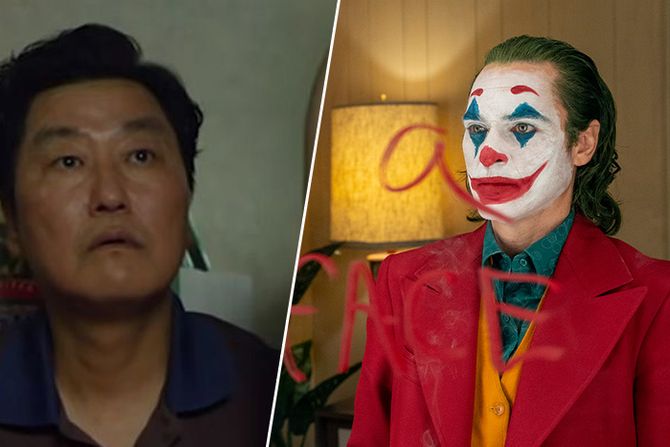
Why "Parasite" is (not) the South Korean "Joker" and why you should see it, regardless of the Oscars
The South Korean "Parasite" made history last night during the prestigious Academy Awards ceremony by winning in four major categories - Best Picture, Best Director, Best Original Screenplay and Best International Feature Film - an unprecedented achievement for a non-English language film. If anyone was breathing down its neck it was probably Todd Phillips' "Joker". Even before the awards ceremony, these two films (but also "Knives Out" which was not nominated for an Oscar) attracted the attention of the audience with their unusual portrayal of inter-class relations.
That the battle would be fought between the movies of Bong Joon Ho and Tod Phillips was clear from the beginning. Perhaps it is because, although culturally, linguistically, aesthetically, and genre-wise distant, they both touch on the question of how brutal the consequences of the social divide can be.

In their own way, both films deal with the drastic division into the rich and the poor. In "Parasite," the Kim family lives in a basement through which rainwater and sewage bring in the dirt from the street, while the Parks on the other side of the city enjoy modern luxuries. Arthur Fleck's miserable apartment opposite the imposing mansion of the Wayne family illustrates this phenomenon in "Joker."
The divide is not only social but also colored by deep prejudice. In both films, the upper class demonizes the lower, and in "Joker" it even violently pushes it away. Arthur Fleck, who works as a clown and lives with a disorder, seems to invoke such behavior - he is an easy target, a subject to disrespect and ridicule, not only before those richer than himself, but also among his peers. Beyond the boundary of scorn lies the cruel brutality of a humiliated man. In both films the characters "snap" suddenly, when they are not even aware of what they can are capable of doing, and when they quickly regret it.
Both Joon Ho and Phillips portrayed people fighting mental illness while struggling with poverty, which only makes them lose ever more rapidly in that battle. Poverty comes from the outside - it is caused by unemployment, layoffs, banks, debt collectors. The characters are both sick and hungry, trapped in dark cellars and confined spaces. In the South Korean film, some of them are literally parasitizing by stealing food from their hosts, unaware that these are in their lives at all.
Outside comes a kind of apocalypse - while Gotham is consumed by the fire of protest and resentment, Seoul experiences a kind of a "biblical flood."
Then again, the rich are also parasites, as they feed off the services of the poor/the sick. Without them, they can't manage in the real world, they don't know how to cook, wash, clean, or even educate their children. Murray Franklin, of whose TV show Arthur is a fan and watcher, exploits Arthur and his mental illness, his perverted image of the world, to make his audiences laugh and improve his ratings. Each in their own way, both are punished for their parasitic nature. They are also punished for that of others, as well, because we can hardly say that "Joker" is a parasite.
However, there is a difference in the relationship between society and the individual in these films. Capitalism, in its worst form, comes down on Arthur Flek, forcing him to become the Joker. The American film portrays the responsibility of the entire society - from the government denying welfare to street children - for the development of the main character's mental illness and even for his revenge. Arthur resists, but any support he finds in that struggle (in therapy, at work, in his family, in his idol, even in his imagination) is persistently stripped away from him.
The Kims, on the other hand, "swim" in their flood, lacking Arthur's naivety. Society doesn't come down on them, they are the ones who find a hole in it and undermine it down from within. However, this hole, even the literal one in the ground, is not a salvation from poverty and metal illness, but perhaps the cause of the latter. The rich family's first parasite develops an unhealthy relationship with Mr. Park. The Kims get lost when one of their members comes across a clear picture of their place in that society. Although not naive, he is not resistant to humiliation, either.
However, while the circumstances faced by the protagonists are similar, neither "Parasite" is "Joker" nor is "Joker" "Parasite." Both films deserve the attention of every viewer, even those who are not guided by the choices of any film academy. These movies are much more than societal images described in this article. Last night's winner, "Parasite," is funny on top of that. At times it's warm, clever, and then frightening. And its big advantage over "Joker" - it's completely original. While watching Tod Phillips' film we know roughly where the plot will take us, while Bong Joon Ho's masterpiece is a new experience. And in all likelihood, "Parasite" is not just another Oscar-winning film we will forget in two years. "Parasite" is a movie for the classics and for eternity.
Video: The Oscar goes to South Korea, Brad and Leonardo give each other a hug
(D.D.S.)
Video: Ovacije za obnovljenu Verdijevu operu "Don Karlos" u Narodnom pozorištu
Telegraf.rs zadržava sva prava nad sadržajem. Za preuzimanje sadržaja pogledajte uputstva na stranici Uslovi korišćenja.

